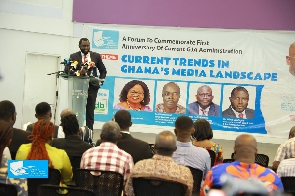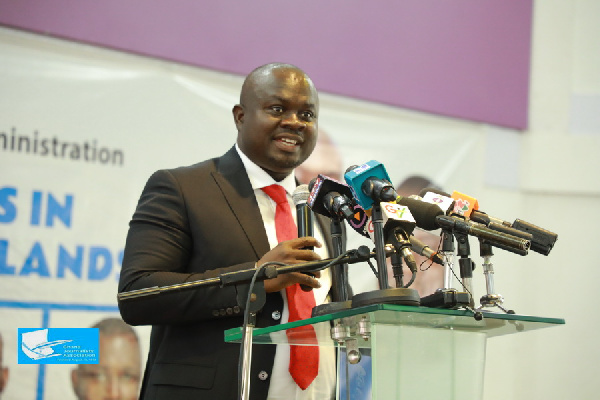 Dr Quashigah speaking at the lecture
Dr Quashigah speaking at the lecture
A law lecturer at the University of Professional Studies - Accra (UPSA), Albert Quashigah, has admonished journalists to take the law on publishing fake news seriously to avoid falling foul of it.
According to him, the law on publishing fake news, which falls under the Electronic Communication Law section 67, does not target journalists but can be used against them.
The law lecturer was speaking at a forum to commemorate the one-year anniversary of the current GJA leadership.
“We need to take the law of Publishing fake news seriously. The electronic communication law section 67 does not target journalists but can be used against journalists so it must be deleted or re-look at to protect journalists," he said.
Lawyer Quashigah, who was speaking on the topic, “An assessment of the criminal law on false news and its application against media practitioners in Ghana,” called for the need to amend that law or rewrite it in order to safeguard Journalists.
“I think this law has been used against journalists. This law must give way,” Dr. Quashigah noted.
On his part, the Director General of the Ghana Broadcasting Corporation (GBC), Prof. Amin Alhassan, expressed worry over the principles of journalism, which he said, have been jettisoned with the advent of the new media.
He explained further that new media, in whatever form, is occasioned by the mainstreaming of digital technologies to the extent that the platforms that they create become the main source of new media cultures of information consumption.
“The old media channels of mediums are giving way to new technoscapes of media platforms. In Broadcasting, this transformation has been phenomenal. Analogue transmission has been jettisoned in favour of multiple platforms of DTT, DTH satellite, Online Streaming, DAB, and much more is to come when G5 networks are rolled out Internet of Things become part of our everyday life,” Dr. Alhassan emphasized.
He said these changes are transforming journalism practice and functions and raising several ethical issues.
According to him, in the new media ecosystem, audience size is not determined by good journalism, adding that it is determined by click baits and amplification strategies, including misinformation content.
“The new media ecosystem has brought about the phenomenon of weaponization of information. Fake news has high virality than truthful news. It even becomes turbocharged if the content is meant to damage the reputation of a target. These are developments that make nonsense of the professional values and ethics of Journalism. The question that stares us in the face is how do to protect journalism and a professional practice that will continue to function as an institution of democracy and development,” he added.
The GJA President, Albert Kwabena Dwumfour, touched on the need for journalists to be guided by their constitutional obligations and work towards the development of the nation.
He said the media is needed the most in such critical times when the country is facing economic challenges.
“Madam Chair, as media professionals, we have a crucial role to play in ensuring the economic growth of the country, particularly in such critical times when the global economy is experiencing difficulties. While highlighting social evils such as corruption and abuse of power, we should also project or highlight activities and programs that promote the economic development of the nation,” the GJA President advised.
Notable and distinguished personalities who graced the ceremony included the Deputy Minister for Education, Fati Abubakar; the Press Attache at the US Embassy, Kevin Brosnahan; and Joyce Asiedu of the US Embassy PR Department, among others.


Ghana’s leading digital news platform, GhanaWeb, in conjunction with the Korle-Bu Teaching Hospital, is embarking on an aggressive campaign which is geared towards ensuring that parliament passes comprehensive legislation to guide organ harvesting, organ donation, and organ transplantation in the country.
Watch the latest episode of The Lowdown on GhanaWeb TV below: